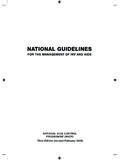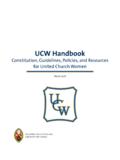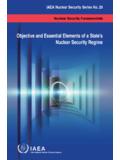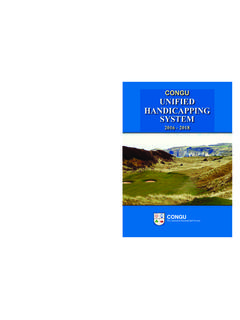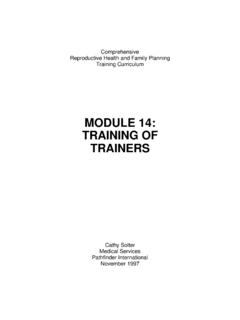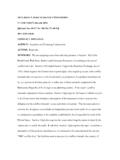Transcription of The DAC Guidelines - Strategies for Sustainable ...
1 INTERNATIONAL development . The DAC Guidelines Strategies for Sustainable development This publication provides policy guidance on good practice in developing and implementing Strategies for Sustainable development . While it focuses on the experience of developing countries, many of the issues covered and lessons drawn are of equal relevance to developed countries. It draws from international experience over the past two decades in both developed and developing countries as well as from a process of multi-stakeholders dialogue in Bolivia, Burkina-Faso, Ghana, Namibia, Nepal, Pakistan, Tanzania and Thailand, to assess their experience of country-level Strategies for Sustainable development . The DAC Guidelines on Strategies for Sustainable development aim to provide guidance for development co-operation agencies in their efforts to assist developing countries towards Sustainable development .
2 They should also be of value to policy-makers, planners and development practitioners, as well as to academics, students and development analysts in all countries.. The DAC Guidelines Strategies for Sustainable development INTERNATIONAL development . The DAC Guidelines Strategies for Sustainable development All OECD books and periodicals are now available on line ISBN 92-64-19505-X. 43 2001 08 1 P. +:ITJMGO=V^ZUZ\: OECD, 2001. Software: 1987-1996, Acrobat is a trademark of ADOBE. All rights reserved. OECD grants you the right to use one copy of this Program for your personal use only. Unauthorised reproduction, lending, hiring, transmission or distribution of any data or software is prohibited. You must treat the Program and associated materials and any elements thereof like any other copyrighted material.
3 All requests should be made to: Head of Publications Service, OECD Publications Service, 2, rue Andr -Pascal, 75775 Paris Cedex 16, France. FIN-43 2001 08 1 p 23/10/01 17:32 Page 1. The DAC Guidelines Strategies for Sustainable development : Guidance for development Co-operation ORGANISATION FOR ECONOMIC CO-OPERATION AND development . Page 1 Wednesday, October 10, 2001 10:53 AM. ORGANISATION FOR ECONOMIC CO-OPERATION AND development . Pursuant to Article 1 of the Convention signed in Paris on 14th December 1960, and which came into force on 30th September 1961, the Organisation for Economic Co-operation and development (OECD). shall promote policies designed: to achieve the highest Sustainable economic growth and employment and a rising standard of living in Member countries, while maintaining financial stability, and thus to contribute to the development of the world economy.
4 To contribute to sound economic expansion in Member as well as non-member countries in the process of economic development ; and to contribute to the expansion of world trade on a multilateral, non-discriminatory basis in accordance with international obligations. The original Member countries of the OECD are Austria, Belgium, Canada, Denmark, France, Germany, Greece, Iceland, Ireland, Italy, Luxembourg, the Netherlands, Norway, Portugal, Spain, Sweden, Switzerland, Turkey, the United Kingdom and the United States. The following countries became Members subsequently through accession at the dates indicated hereafter: Japan (28th April 1964), Finland (28th January 1969), Australia (7th June 1971), New Zealand (29th May 1973), Mexico (18th May 1994), the Czech Republic (21st December 1995), Hungary (7th May 1996), Poland (22nd November 1996), Korea (12th December 1996) and the Slovak Republic (14th December 2000).
5 The Commission of the European Communities takes part in the work of the OECD (Article 13 of the OECD. Convention). In order to achieve its aims the OECD has set up a number of specialised committees. One of these is the development Assistance Committee, whose Members have agreed to secure an expansion of aggregate volume of resources made available to developing countries and to improve their effectiveness. To this end, Members periodically review together both the amount and the nature of their contributions to aid programmes, bilateral and multilateral, and consult each other on all other relevant aspects of their development assistance policies. The Members of the development Assistance Committee are Australia, Austria, Belgium, Canada, Denmark, Finland, France, Germany, Greece, Ireland, Italy, Japan, Luxembourg, the Netherlands, New Zealand, Norway, Portugal, Spain, Sweden, Switzerland, the United Kingdom, the United States and the Commission of the European Communities.
6 Publi en fran ais sous le titre : Les lignes directrices du CAD. STRAT GIES DE D VELOPPEMENT DURABLE. OECD 2001. Permission to reproduce a portion of this work for non-commercial purposes or classroom use should be obtained through the Centre fran ais d'exploitation du droit de copie (CFC), 20, rue des Grands-Augustins, 75006 Paris, France, tel. (33-1) 44 07 47 70, fax (33-1) 46 34 67 19, for every country except the United States. In the United States permission should be obtained through the Copyright Clearance Center, Customer Service, (508)750-8400, 222 Rosewood Drive, Danvers, MA 01923 USA, or CCC Online: All other applications for permission to reproduce or translate all or part of this book should be made to OECD Publications, 2, rue Andr -Pascal, 75775 Paris Cedex 16, France.
7 FIN-43 2001 08 1 p 23/10/01 17:32 Page 3. PREFACE 3. Preface T. his document provides policy guidance on good practice in developing and implementing Strategies for Sustainable development . The guidance focuses on the experience of developing countries, but many of the issues covered and lessons drawn are of equal relevance to developed countries. While the guidance looks at how development co-operation agencies can best assist developing countries, it should also be of value to policy-makers, planners and development practitioners in all countries, as well as of interest to academics, students and development analysts. The guidance is the first major output of a project initiated by the OECD DAC. Working Party on development Co-operation and Environment (WP/ENV).
8 A Task Force chaired by the UK Department for International development (DFID) and the European Commission (EC) has overseen the project. In developing this guidance, international experience over the past two decades in both developed and developing countries has been drawn on. This experience and the lessons derived from it have been validated and built on through dialogues in selected developing countries. During 1999-2001, members of WP/ENV worked in partnership with teams from eight developing countries to assess their experience of country-level Strategies for Sustainable development : Bolivia, Burkina Faso, Ghana, Namibia, Nepal, Pakistan, Tanzania and Thailand. In addition, other agencies have contributed their experience: the United Nations development Programme (UNDP) (Capacity 21), the UN Department for Economic and Social Affairs and the World Bank.
9 The Inter- national Institute for Environment and development (IIED) was responsible for co-ordinating the dialogues and provided technical support for the preparation of this document. Through dialogues involving stakeholders from government, the private sector and civil society, past and existing strategic planning experiences have been analysed, key issues and challenges identified, and principles for good practice developed. An iterative process involving in-country discussions and three international workshops in Tanzania, Thailand and Bolivia, has led to consensus on this final text. A second output a source book (to be prepared during 2001) will contain a detailed exploration of the challenge of Strategies for Sustainable development , with lessons, case materials, and methodologies from the dialogue countries and elsewhere.
10 This source book will provide guidance on how to develop and implement Strategies for Sustainable development , providing examples of processes and mechanisms that have been shown to work. OECD 2001. FIN-43 2001 08 1 p 23/10/01 17:32 Page 5. TABLE OF CONTENTS 5. Table of Contents PREFACE 3 1. Sustainable development AND. THE NEED FOR STRATEGIC RESPONSES 19. ACRONYMS 9 Establishing national Strategies for Sustainable development : a Rio commitment and one of the Strategies FOR Sustainable seven international development Goals 19. development STATEMENT 11. Challenges to Sustainable development 19. Trends, major challenges, and responses 19. EXECUTIVE SUMMARY 15. Decentralisation and globalisation 20. What is the purpose of this policy guidance?










